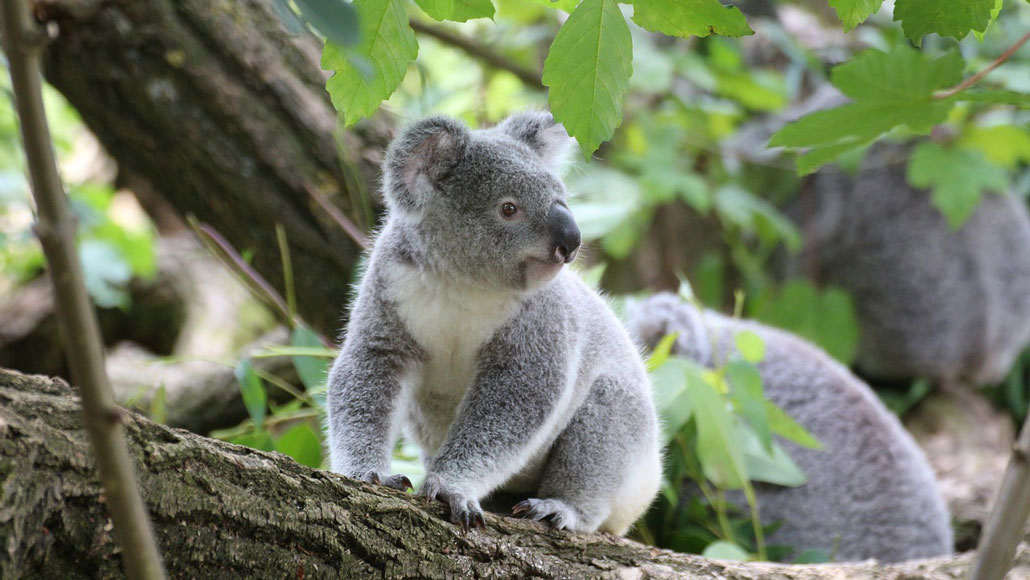
Some koalas prefer to eat only one type of eucalyptus. But changing the makeup of bacteria in the animals’ guts through fecal transplants may put other options on the menu.
The University of Queensland
A tale of fecal transplants Down Under hints that microbes could help choosy koalas expand their diets.
Capsules loaded with intestinal bacteria changed the gut microbial communities of recipient koalas, and may have helped shift the animals’ diets. These fecal transplants gave microbes from koalas that mostly ate one type of eucalyptus, called messmate, to other koalas that usually munched manna gum, a different eucalypt. Some of the koalas that received the treatment upped their messmate intake, researchers report August 21 in Animal Microbiome.
“The more that [the microbial community] changed, the more messmate they ate, which suggests that the microbiome is influencing what the koalas are able to eat,” says Michaela Blyton, an animal ecologist and microbiologist at the University of Queensland in Brisbane, Australia.
Some koalas will eat several eucalypts, while others stick to one type. The animals are listed as vulnerable in some parts of Australia, and a restricted diet can get them into trouble. In 2013, the koala population in Cape Otway in southern Australia boomed and chowed through leaves of their preferred manna gum (Eucalyptus viminalis), killing many of the trees. Even though messmate (Eucalyptus obliqua) was available, koalas there starved to death. So having a tool to help make the animals less choosy when it comes to food could be useful for conservation.
Blyton and colleagues wondered if changing koalas’ gut microbiomes — the collections of intestinal bacteria and other microbes found in an organism — could help the marsupials adapt to other foods in a pinch. Koalas rely on those microbes to help them digest eucalyptus, which varies by species in protein and fiber content and in the types of toxins in the leaves. The team tracked messmate koala eaters and collected their poop and extracted its microbes, which the scientists packaged into acid-resistant pills for manna gum–eating koalas that were captured and brought to the lab.
The microbiomes of those koalas were monitored for a few days. Then, half of the 12 koalas studied were given fecal transplant capsules from messmate eaters, and half fecal transplants pills from manna gum eaters as a control. Koalas received the poop pills for nine days, before their food intake and gut microbes were monitored for an additional 18 days.
There wasn’t a huge difference between the treatment and control groups in terms of messmate consumption. But koalas that received the fecal transplant from messmate eaters ate more of that eucalyptus once their gut bacteria more closely resembled the gut bacteria of messmate eaters. Still, how well the fecal transplants took hold varied among individual koalas, says Blyton, who mostly worked on the project while at Western Sydney University. One koala increased its messmate intake to nearly half of its total food consumption.
“The ability to change the microbiome of an animal like a koala is pretty impressive,” says Kevin Kohl, an animal physiologist at University of Pittsburgh, who studies the microbiome but was not part of the study. Most such transplants have been done in small lab animals, with greater success in sterile rodents as opposed to animals captured from the wild who come with their own microbial community.
But Kohl isn’t quite convinced that fecal transplants caused some koalas to chomp more messmate. While consumption and the microbiome are correlated, it’s “hard to disentangle whether it was the microbiome [changing] the food intake or the food intake changing the microbiome,” he says.
“The work is really creative,” says Denise Dearing, a nutritional ecologist at the University of Utah in Salt Lake City who has collaborated with two of the study coauthors on other projects. “We may be able to use fecal transplants to help conserve [threatened or] endangered species,” she says.
For koalas, that could mean giving them fecal transplants when the animals are captured and moved to new habitats, Blyton says. Or the pills could be used as a probiotic to help koalas’ microbiomes bounce back after a bout of antibiotics, which many koalas in northern Australia receive to treat chlamydia.







